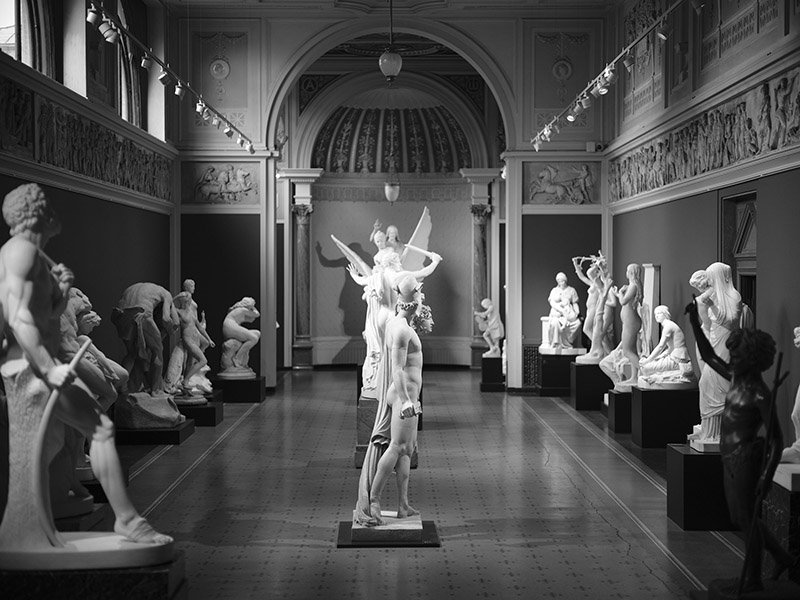Sculptures and Art at Ny Carlsberg Glyptotek in Copenhagen

One of the many exhibit areas at the Ny Carsberg Glyptotek in Copenhagen
We Pay a Visit to Glyptoteket in Copenhagen
Once or twice over the years, we poked our heads into the main foyer of the Ny Carlberg Glyptotek in Copenhagen but we never took our time to fully explore this enchanting display of sculptures and art in the heart of Copenhagen.
We are a couple in our late fifties who lived in Denmark up until the early nineties and since then moved to Canada. On a recent visit to Copenhagen, we decided to make amends and booked tickets to the Glyptotek.
From Wikipedia: The Ny Carlsberg Glyptotek, commonly known simply as Glyptoteket, is an art museum in Copenhagen, Denmark. The collection represents the private art collection of Carl Jacobsen, the son of the founder of the Carlsberg Breweries.
"The Water Mother" sculpture by Kai Nielsen, 1921, at Ny Carlsberg Glyptotek in Copenhagen
"Orestes Fleeing from the Eumenides", 1950, by H.W. Bissen at Glyptoteket
A Taste for Art
On those earlier visits where we merely poked our heads in, I was much younger and perhaps had not yet developed an appreciation for the beauty in art. Or perhaps I was just busy being young.
As a photographer, however, I found myself come alive amidst the beauty of it all and challenged myself to capture images of the artwork to the best of my ability.
I chose mainly black and white for the photos in this post as I find this a perfect way to portray the sculptures. I also took photos of my four favorite paintings. Please see more below.
The text connecting my photos below is from a display at the Ny Carlsberg Glyptotek
French and Danish Sculptures
The Glyptotek's collection of French and Danish sculpture reflects the passion of the museum's founder Carl Jacobsen for the narrative power of sculpture in grandiose, dramatic depictions of humankind and the basic conditions of life.
The sculptures at the Glyptotek Gallery were created by some of the leading French and Danish sculptors of the 19th century.
Ny Carslberg Glyptotek sculpture
Theirs was sculpture based on academic and artistic ideals of form, content, and expressiveness, taking the art of ancient Greece and Rome as its main source of inspiration.
In France sculptors adhered to the traditions perpetuated by the French art academy and the Salon - the official juried exhibition of the academy in Paris.
During the later 19th century, in particular, salon art represented established tastes. From around 1900 onwards, however, many started to consider it outdated.
Salon Art
For Carl Jacobsen, however, the expressive power and technical virtuosity of salon sculpture were amongst the finest art since the sculpture of antiquity. In Denmark, sculptors also followed the traditions upheld by the art academies of Europe.
As the works in these galleries show, the favorite subjects for sculptures were historical, mythological, religious, or literary, depicted from a psychological, moral, or sentimental perspective.
Ancient myths and biblical narratives were particularly rich sources of motifs. Portrait busts, monuments, and memorials with heroic portrayals of historical and contemporary figures were also popular.
Buste at Glyptoteket
Christian Lemmerz “Todesfigur”, 2012
One of the pieces that drew us in at Glyptoteket was Christian Lemmerz’ “Todeusfigur” (death figure). It is placed in one of the main staircases and can be viewed from various interesting angles and stands alone in stark contrast to the architecture of the building.
The hidden body beneath the drapery is haunting and yet beautiful at the same time and looks so real. So real that you almost want to touch it.
"Todesfigur" by Christian Lemmerz, 2012. Ny Carlsberg Glyptotek, Copenhagen
"Todesfigur" by Christian Lemmerz, 2012. Ny Carlsberg Glyptotek, Copenhagen
"Todesfigur" by Christian Lemmerz, 2012. Ny Carlsberg Glyptotek, Copenhagen
A sculpture in the main lobby at Glyptoteket in Copenhagen
My Four Favorite Paintings at Glyptoteket
Being a travel photographer as well as a street photographer I was drawn to the four paintings you will see below. The colors and compositions are tremendously well executed in these pieces, all from the nineteenth century.
Whenever we are in a big city while traveling we often seek out either photography or art exhibitions as I find this is an excellent inspiration for my photography.
The Bayezid Mosque in Constantinoble (1875), Painting ny Herald Jerichau (1851-1878) on display at Ny Carlsberg Glyptotek in Copenhagen. Oil on canvas.
The Beach at Posilipo (1821). Painting by J.C. Dahl (1788-1857) on display at Ny Carlsberg Glyptotek. Oil on canvas
Greeks fetching water from the well at the Tower of the Winds in Athens (1836). Painting by Marinus Rørbye (1803-1848) on display at Ny Carlsberg Glyptotek. Oil on canvas.
London Street montage, side view of the British Museum, painted by Vilhelm Hammershøi, 1905-1906, on display at Ny Carlsberg Glyptotek in Copenhagen
The Ny Carlsberg Glyptotek was a wonderful surprise for us and by far exceeded our expectations. The blend of sculptures, art exhibits, and paintings constantly had us in awe.
There is a courtyard restaurant and roof-top viewing platform where you can gaze out over the rooftops of Copenhagen. We warmly recommend Glyptoteket if you find yourself in Copenhagen with a few hours to spare.
For more information, check the official site here:
5050 Travelog Destinations
All Travel Destinations
Europe
Southeast Asia
Middle East
Canada and USA
New Zealand
The photos in this article are made using a Fujifilm GFX 50R, Voigtländer 75mm f/1.9 MC and GF 50mm f/3.5 R LM WR lens (links to my camera and lens reviews). Editing was done in Capture One Express. I have used Fujifilm film simulations for the photos in this post.
